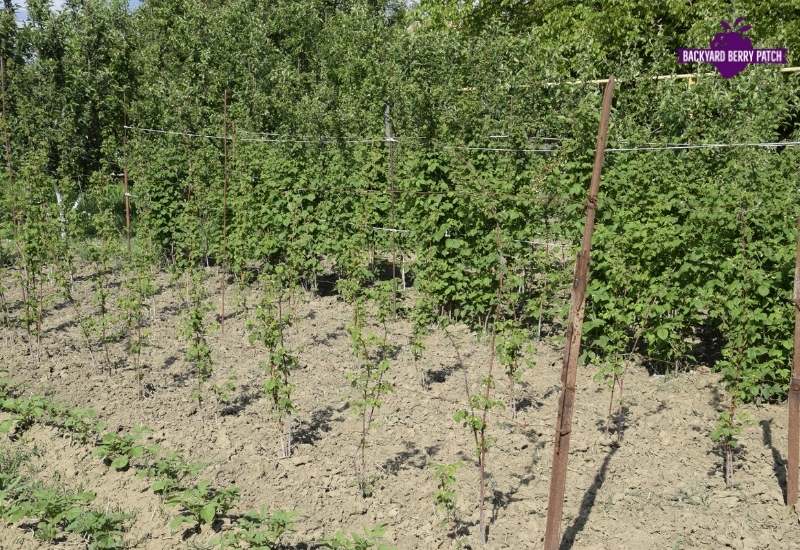Raspberries are a popular fruit that can be grown in gardens or on farms. These plants require proper care and maintenance to produce a bountiful harvest. One of the most important aspects of raspberry care is fertilization. Fertilizing raspberries is essential to ensure that the plants receive the necessary nutrients for growth and fruit production.
When it comes to fertilizing raspberries, it is important to understand the specific needs of these plants. Raspberry plants require a fertilizer that is high in nitrogen, as this element is essential for vegetative growth and early fruit development. However, it is also important to provide a balanced fertilizer that includes other essential nutrients. The timing and amount of fertilizer applied will depend on the variety of raspberry plant, the soil type, and the climate.
Whether you are a seasoned raspberry grower or a beginner, understanding the basics of fertilizing raspberries is crucial. In this article, we will discuss the different types of fertilizers that are suitable for raspberry plants, the best times to fertilize, and how to apply fertilizer effectively. By following these guidelines, you can ensure that your raspberry plants are healthy and productive, providing you with a delicious harvest of fresh fruit.

Why Fertilize Raspberries
Raspberries are a delicious and nutritious fruit that can be grown in your own backyard. However, to get the best yield and quality of fruit, it is important to fertilize your raspberry plants. Fertilizing your raspberry plants will ensure that they have the necessary nutrients to grow strong and healthy, which will lead to a bountiful harvest.
Raspberry plants have specific nutrient requirements, and if these nutrients are not present in the soil, the plants will not grow properly. Fertilizing your raspberry plants will provide them with the necessary nutrients, such as nitrogen, phosphorus, and potassium, which are essential for growth and fruit production.
Additionally, fertilizing your raspberry plants will help to prevent nutrient deficiencies, which can lead to stunted growth, poor fruit quality, and even plant death. By providing your raspberry plants with the nutrients they need, you can ensure that they will grow strong and healthy, and produce a bountiful harvest of delicious fruit.
When to Fertilize Raspberries
Raspberries are heavy feeders and require regular fertilization to produce healthy growth and abundant fruit. The timing of fertilizer application is crucial to ensure that the plants receive the nutrients they need at the right time. Here are some tips on when to fertilize raspberries:
- For newly planted raspberries, wait until they are established before fertilizing. This is usually about four weeks after planting.
- For established raspberry plants, fertilize them in early spring before new growth begins. Apply 4 to 5 pounds of 10-10-10 or a similar analysis fertilizer per 100-foot row. Uniformly broadcast the fertilizer in a 2-foot band.
- If your raspberries are mulched with sawdust, wood chips, or corn cobs, apply a slightly heavier rate of fertilizer.
It’s important to avoid fertilizing raspberries too late in the season, as this can lead to a premature, unwanted release of nitrogen. This endangers the winter hardiness of the raspberries. If you’re not sure when to fertilize your raspberries, consult with a local gardening expert or extension agent for advice specific to your region.
Overall, fertilizing raspberries is an essential part of maintaining healthy plants and ensuring a bountiful harvest. By following the guidelines for when to fertilize, you can help your raspberries thrive and produce delicious fruit year after year.
Types of Fertilizers for Raspberries
Choosing the right type of fertilizer for your raspberry plants is crucial for their growth and development. Here are some common types of fertilizers that are suitable for raspberries:
- Organic Fertilizers: Organic fertilizers are made from natural materials such as animal manure, bone meal, and compost. These fertilizers are slow-release and provide a steady supply of nutrients to the plants over time. They are also environmentally friendly and improve soil health.
- Synthetic Fertilizers: Synthetic fertilizers are chemical-based and provide a quick boost of nutrients to the plants. They are easy to use and can be applied in precise amounts. However, they can be harmful to the environment and may lead to soil depletion over time.
- Natural Fertilizers: Natural fertilizers are made from natural materials and are a combination of organic and synthetic fertilizers. They provide a balance between slow-release and quick-release nutrients and are environmentally friendly.
When choosing a fertilizer for your raspberry plants, it is important to consider the nutrient content and the N-P-K ratio. The N-P-K ratio refers to the amount of nitrogen, phosphorus, and potassium in the fertilizer. Raspberry plants require a fertilizer that is high in nitrogen, but also contains phosphorus and potassium for optimal growth.

It is also important to consider the pH level of the soil. Raspberry plants prefer a slightly acidic soil with a pH level between 5.5 and 6.5. If the soil is too acidic or alkaline, the plants may not be able to absorb the nutrients from the fertilizer.
Overall, choosing the right type of fertilizer for your raspberry plants is crucial for their growth and development. Organic and natural fertilizers are a great choice for environmentally conscious gardeners, while synthetic fertilizers may be a better option for those who need a quick boost of nutrients.
How to Fertilize Raspberries
Raspberry plants require regular fertilization to produce a healthy and bountiful harvest. Here are some tips to help you fertilize your raspberry bushes effectively:
- Choose the right fertilizer: Raspberry plants require a well-balanced fertilizer that is rich in nitrogen, phosphorus, and potassium. You can use either organic or chemical fertilizers, but make sure to choose a fertilizer that is specifically formulated for berry plants.
- Fertilize at the right time: Fertilize your raspberry plants in early spring, just as new growth begins to emerge. Avoid fertilizing your plants too late in the season, as this can stimulate new growth that may not have enough time to mature before winter.
- Apply the fertilizer correctly: Apply the fertilizer evenly around the base of the plant, taking care not to get any fertilizer on the leaves or stems. Use a hoe or rake to gently work the fertilizer into the soil.
- Water your plants: After fertilizing your raspberry plants, be sure to water them thoroughly. This will help to distribute the fertilizer evenly throughout the soil and encourage healthy growth.
Remember to fertilize your raspberry plants regularly throughout the growing season, typically every 4-6 weeks. By following these simple steps, you can help ensure that your raspberry bushes produce a bountiful harvest year after year.
